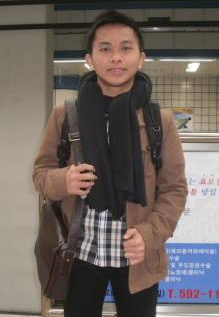
Name: Joseph Jasmin Ubas
Nationality: Filipino
Age: 20
Major: Biology
Nationality: Filipino
Age: 20
Major: Biology
1: Please introduce your home town in the Philippines
I grew up in Manila, which is my hometown, and it has provided my education since childhood. The Philippines, which has English as a second official language, is one of the countries where Koreans plan to study English. Since it is home to some enchanting tourist destinations, a lot of foreigners love to tour the Philippines in the holidays. Besides those reasons, Filipinos are also known as fun-loving and very hospitable people, thus attracting more people to our country.
2: How did you come to Korea?
I was a freshman back home taking a B.Sc. in Biology in one of the universities in Manila. I came across this invitation to study abroad through the recommendation of a Korean missionary. I willingly accepted the invitation. Through the 5-year program of the National Institute for International Education, NIIED, I came to Korea as a Korean Government Scholar. I am currently taking my 4th level Korean language class here in Keimyung University.
3: Could you tell us the differences between education in Korea and the Philippines?
I can only find a few differences between the two. In the Philippines, most of the classes are taught in English except for those which include Filipino language and literature. In my country, we have many activities, experiments, and projects to help us further improve the lessons we’ve learned. Those activities also help maintain a good relationship between teachers and students.
4: What is your most memorable memory in Korea?
The tradition that will always remind me of Korea is its greeting etiquette, that every time you greet someone higher than you, you need to bow as a sign of respect. Upon entering this university, I met a lot of Korean friends which left an impression about how serious they are in their studies. Studying without stop, taking exams, Koreans taught me not only the importance of education but dedication to one’s goal.
5: Would you please say something to Keimyung students?
To my fellow Keimyung students, no matter how hard university life is, I believe in this saying you have in Korea, “gojin gamre,” which means “sweet after bitter.” Even though we suffer from difficulties in the pursuit of our dreams, the happiness we attain later will be incomparable. To my friends who became a great help to improve my Korean skill, thank you very much. Let’s continue dreaming, continue reaching for new heights, and make the best of what we can be. To all of us, FIGHTING!








